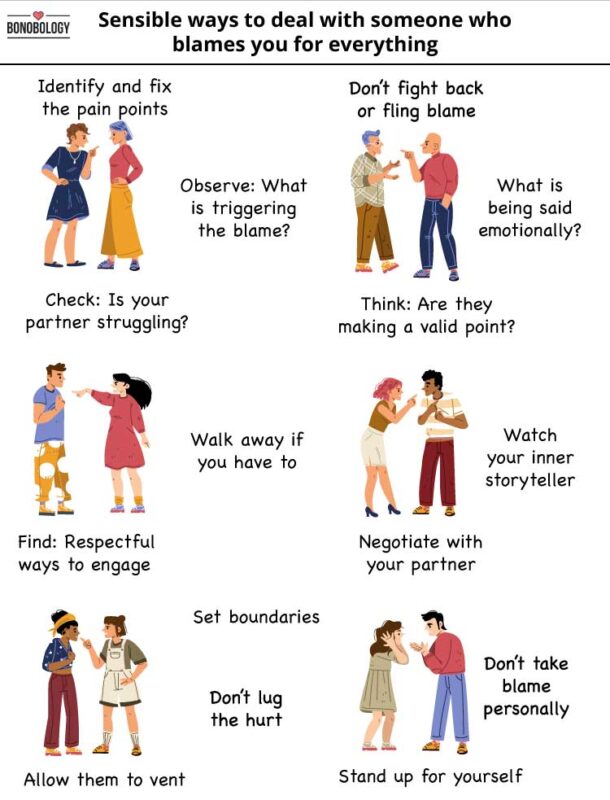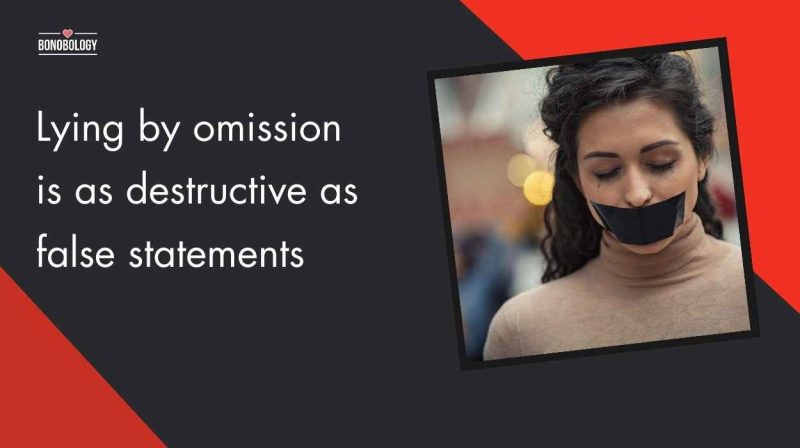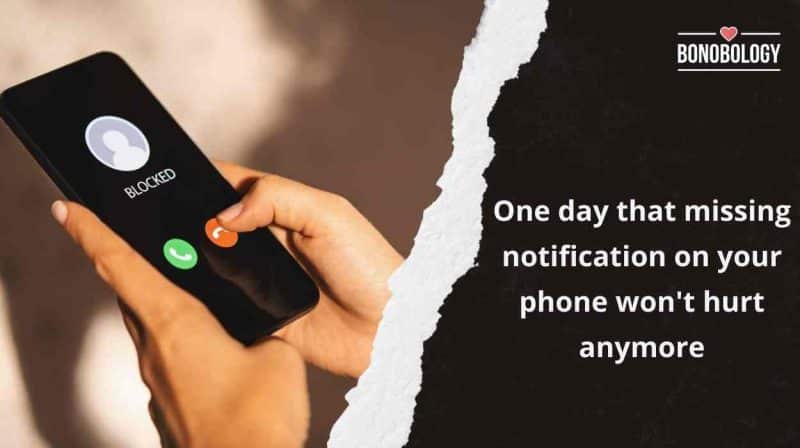Has your significant other been blaming you for everything lately? In the chemistry of relationships, constant blame is a corrosive agent. It weakens trust, eats away at love, and ultimately wears down romantic bonds. Being at the receiving end of constant blame like:
- “I wouldn’t be so angry, if you…”
- “You always…”
- “You never…”
is understandably frustrating. So what should you do if you find yourself being blamed for everything in a relationship? We turned to psychologist Jayant Sundaresan (Masters in Applied Psychology), who specializes in offering counseling for a range of relationship issues, such as communication breakdown, expectation management, infidelity, separation, and divorce in order to understand how to deal with someone who blames you for everything.
Where does blame stem from?
Table of Contents
Before trying to deal with blame, it is important to understand where it stems from. According to Jayant, blame comes from unexpressed anger that is bubbling inside. He tells us the common reasons for a blaming attitude:
- Often, it is resentment
- It could be due to something the person being blamed has actually done or not done
- They are upset over a number of things, but they have not spoken about it out loud
- There could be a lack of happiness or contentment with life
- Work could be in trouble
- There might be issues in the relationship
- It could even point to shades of a narcissistic personality
What is blaming someone else for your problems called?
Blaming someone else for your problems is called projecting. “It’s black-or-white thinking: Your blaming partner believes that you are the only reason they’re having a bad day. But maybe they are just sleep-deprived or overworked. Maybe they have squabbled with a parent. Maybe they have looked in the mirror and felt they have aged or are out of shape,” says psychologist Dr. Aman Bhonsle.
But instead of dealing with things, they’ve gotten moody and angry or heaped blame on you, the partner who left their socks on the living room floor. “The socks are just the straw that broke the camel’s back,” he says.
This often tends to be a habit, he adds. And it could be something they picked up from early environments, according to psychologist Manjari Saboo.
Related Reading: 8 Ways Blame-Shifting In A Relationship Harms It
21 Sensible Ways To Deal With Someone Who Blames You For Everything
Habits and old patterns of thinking are like comfy sweatshirts or well-worn jeans. They may not be flattering, but they sure are familiar, as author Dr. Brené Brown points out. So when we feel pain or anger or struggle more than usual, it is far easier to reach for these habits, or in this case, find someone to pin the blame on.
But being blamed for everything in a relationship can be distressing. You’ve been assigned a negative intention and your partner is essentially telling you that you are the problem in the relationship. So what’s the fix? Here are some sensible tips on how to deal with someone who blames you for everything:
1. Resist the urge to fight back
So how do you respond to someone who blames you all the time? According to Jayant, there are three typical traps people fall into when faced with constant blame:
- They explode with anger
- Get passive-aggressive
- Or, brush things under the carpet
None of them do much good. According to three psychologists on our panel:
- “It’s best not to react as arguing right away will only build the fight.” – Juhi Pandey
- “Try not to point out your partner’s blaming habit in front of friends, neighbors, or relatives.” – Manjari
- “By fighting blame with blame or reacting angrily, you may end up creating new problems.” – Aman
So, tempting as it may be to react in kind, take a deep breath and step back. Remind yourself of the positives in your partner, let go of trying to establish who’s right and wrong, and see if you can respond from a place of affection instead.
2. Practice open communication
My husband finds fault with everything I do. My boyfriend blames me for his behavior. If that is becoming a theme in your relationship, maybe some communication is called for.
“Blame essentially points to a breakdown in communication. When communication is open, transparent, and clear, things stay small and get resolved early,” says Jayant.
“So, practice some acceptance and patience, and keep communication open,” says Juhi. This also means that you will have to let your partner know you’re feeling blamed, especially if every conversation is turning into an argument and a finger-pointing exercise.
3. Share some perspective – yours and theirs
Juhi has two tips on what to say to someone who blames you:
- Present your logic
- Ask them, “Why do you think I’m the only one responsible?”
This will help you distill the reality of the situation or get a better handle on where your partner is coming from.
“See, if a person blames everyone for everything, that’s a different situation. But if your partner is blaming only you constantly, it points to discontent within the relationship. Maybe there is a mismatch between their expectations of the relationship and reality,” says Jayant.
See if you need to manage their expectations in the relationship, or if you need to state yours more assertively, or if a compromise is required. Two people in a relationship don’t always know what the other is thinking, so talk about it.
4. Let them vent
How do you respond to someone who blames you? Listening mindfully to what they have to say is one way. Sometimes, the shortest distance between two people really is honest conversation.
If you’ve decided to talk things through, Jayant offers some advice:
- Give your partner the time and space to vent
- Do not interrupt them till they finish
- Do not start planning your answer
- Do not think of a comeback or sarcastic comment
“This is a part of the deal of an adult relationship. Your partner is going to have some pieces missing. Until those pieces are fixed or healed, they are going to show behaviors you are not fond of. You have to find a way to handle it. And the same applies to you. You just don’t know it,” he says.
Related Reading: 12 Hurtful Things You Or Your Partner Should Never Say To Each Other
5. If you’re being blamed for everything in a relationship, take an internal inventory
As per Aman, when someone blames you for their anger, flips an argument on you, or when they hurt you and they get mad themselves, do a quick internal inventory. He adds, “See whether the person is making a valid point in the first place.”
This will also help you understand whether the blame is aimed at you or not, whether you need to feel guilty at all, and if you need to make amends. Be impartial. Sometimes blame may be an attempt by a partner to shrug off accountability for their actions, break your confidence, or even, a sign of a controlling partner, opines Quora user Sharon Milner.
“I suggest taking on the problem and asking them how ‘we’ can resolve it. This way, they can take some accountability for resolution,” she adds.
6. Identify the pain points and try to fix them
Here’s another tip on how to deal with someone who blames you for everything: Try to find out which situations or actions are triggering the blame, says Manjari.
Jayant adds to this, “There will always be these pet topics that your partner may get easily worked up about. It could be about how you divide your household chores or how you raise your children. When you know what the pain point is, try to isolate it, and take small steps to fix it.”
The key here is to be realistic with your expectations. Restoring a relationship takes time. Don’t expect the blame to end the minute you act on it.
7. Notice the pattern
Wondering what to say to someone who blames you constantly? First, notice their behavior when emotions are high. It will help you understand their patterns and tendencies and come up with an appropriate response.
“There are certain things that will piss off your partner more, and certain things that will calm them down. Also, you will need to figure out the threats that are being used. Did they make threats but didn’t mean them? Or did they mean the threats that they made?” asks Jayant.
“Then take half a step back and observe the situation. Work on understanding the pattern as it presents itself. What is triggering the behavior? Does it usually follow the same path?” he adds.
8. Try to see your role in the problem
“Behind every complaint is a deep personal longing,” according to author Dr. John M. Gottman. So when they hurt you and they get mad instead or blame their behavior on you, maybe it’s a sign your partner wants something from you. Or, perhaps you really are guilty of one or two little things.
Did you consciously or maybe unwittingly contribute to the problem? Is there any part you need to take responsibility for? Then do so. Jayant has some pointers:
- Don’t just say sorry
- Explain what happened
- Help them understand how it won’t happen again
- Make it up to them by doing something they value
Related Reading: Responsibility In Relationships – Different Forms And How To Foster Them
9. Negotiate with your partner if you’re always blamed for everything
When someone is pulling out the blame card and tempers are high, sitting down and talking rationally may not always be possible. “So pick a more neutral time to approach your partner and negotiate with them,” says Juhi. Wondering how to negotiate with your partner? Aman has two suggestions:
- Ask them why they feel the need to constantly tell you that something is missing in you
- Tell them that if they tell you things from a place of generosity and patience, if they ask you calmly, you may feel more inclined to look into them
10. Dissect the emotion behind the blame
Read between the lines, and the blame. When they hurt you and they get mad or flip an argument on you, shift your focus away from the words and try to understand what is being put across emotionally. Maybe there are some emotional needs that they are trying to express here.
“Perhaps that part is more important than what is being said in terms of facts and statements. What are they actually feeling? They may be trying to communicate this but because they are emotionally charged, they may not be finding the right words or striking the right tone,” Jayant says.
“So focus on what your partner is feeling. You both need to work on that first before figuring out how you got there.”

11. Check if your partner is struggling more than usual
Blame often stems from an inability or unwillingness to deal with something. So when someone blames you for their anger or flips an argument on you, it could be a sign they are having a hard time and in need of more support than usual.
If your partner is going through a difficult phase, then:
- “You may need to support them mentally, emotionally, and physically. You may even need to adjust a little for the sake of building a harmonious relationship,” says Manjari
- “Perhaps you may need to set aside your plans and be with them. By doing this, the intention you will be showing is one of ‘we’–of a team. This cannot be shown by saying, but by doing,” says Jayant
12. Work as a team to find a solution
Here’s another tip on how to deal with someone who blames you for everything. Try to shift the focus to a healthier, more collaborative mindset. This way if there really is a problem, the two of you can come up with a solution you both can live with.
According to Aman, the challenge is to remove the opinions, examine the facts, and decide as a team:
- What do you want to do with the facts?
- Do you just want to sit on the facts?
- Or, do you want to act in a way that is constructive and restorative for the relationship?
Related Reading: 9 Activities To Rebuild Trust In A Relationship
13. Try to find respectful ways to engage
When someone does something we don’t like, we rarely pin it on bad circumstance. So when your blaming partner comes home and the dishes are spilling out of the kitchen sink, it is far easier for them to think that you’re not doing enough rather than that you must have had a busy day. And this seeps into the conversation, too.
So finding better ways to engage or ways to fight respectfully could be one answer for how to deal with someone who blames you for everything. “Initially, be respectful and kind when you are giving feedback to them. Why does it have to become a nasty experiment?” says Aman.
14. Put your relationship above everything else
At the end of the day, what matters most is how much you both value your relationship. Because if you do, then you will be willing to look past their behavior, let go of some things, and work on the stuff that needs attention.
15. Get professional help if you’re still blamed for everything in the relationship
Another tip on how to deal with someone who blames you for everything is to bring in a mediator. “It could be a family member, friend, or a couple’s therapist. Someone who is objective and can bring greater learning to the situation,” says Aman.
Jayant agrees. “You may need to get professional help to build an adult relationship so that when there is a problem or when you need to discuss complexities that are creating unhappiness, both of you can express your feelings, whether positive or negative, in a manner that is respectful and constructive, rather than losing control.”
If you’re looking for help, counselors on Bonobology’s panel are just a click away.
16. Set some boundaries
My husband finds fault with everything I do. My boyfriend blames me for his behavior all the time — If blame is becoming a pattern, then you may need to set some emotional boundaries. Sometimes, you may need to move away and have the conversation at a later time, says Juhi.
Here’s what you can say to a partner who blames you for everything:
- I know you are upset right now, so can we talk about what’s really going on so I can help?
- I want to talk this through, so can we take some time to cool off and talk about this later?
- I cannot have this conversation if you continue to blame me

17. Sometimes you may need to walk away completely
By now, you know how to deal with a man that blames his woman for everything or vice versa. But here’s something you must not put up with: toxic blame. Leave when things start getting abusive.
“When blame becomes vindictive, someone starts saying nasty things or tries to punish or play mind games with someone, it borders on emotional abuse,” warns Aman.
“If you’re being blamed for everything in a relationship and you find it hard to tolerate it, or nothing is getting resolved, then it is better to make your way out of the relationship because eventually, it will hurt you and your peace of mind,” says Juhi.
Related Reading: When You Need To Walk Away From A Relationship? 11 Signs That Indicate It’s Time
18. Don’t take it personally
Why am I always to blame in the relationship? If that’s what you’re thinking, hold the thought. “Very few people are willing to accept that they are wrong, even when it’s obvious that they are. Some outright refuse to admit they’re wrong, while others try to justify their incorrectness with the actions of others. I wouldn’t take it too personally,” says one Quora user George Hatcher.
Just because your partner says you are to blame, it doesn’t mean you are. Often, what people say is really more about them. So try to tune out the blame and lean into why your partner could be saying what they are saying with an open mind.
19. Do not lug the hurt
When someone hurts you but blames you back, when your spouse says hurtful things, don’t pick up the hurt, hold it, rub it into your heart, snuggle with it, and carry it around for a long time, Brené advises. “You gotta see it and step over it or go around it and keep on going,” she adds.
If you carry the hurt with you, especially after the issue has been resolved, it’ll build resentment and bitterness with your partner. If hurt is all you feel, though, then it’s time to reevaluate if you want this relationship or not.
20. Watch your inner storyteller
When someone blames you for their anger or when someone hurts you but blames you back, it is important to watch your response. A lot of times, it is the stories we tell ourselves about situations and circumstances and the narratives we build around them that tend to pull us down.
So own your story, connect with your truth, and live it. Don’t let blame muddy the script.
21. Stand up for yourself
Why am I always to blame in the relationship? If that’s a question that is coming up over and over, then it’s time to introspect: Have you left yourself open to blame?
Sometimes, one partner may be very submissive initially, so the other may become emboldened to throw their weight around, says Aman. “If people blame you and you keep taking it, they will get used to treating you like a human punching bag. Eventually, you may end up going through depression or a negative spiral of behavior,” he adds.
“In my past, I have allowed myself to be mistreated because of a fear of confrontations … I know it’s scary but I must tell you that learning to stand up for yourself is one of the most freeing and confidence-building things you can do,” says Quora user Bonnie Lyons.
Standing up for yourself is more than simply confronting your partner. It’s about practicing accountability, with your partner and yourself. It’s about being true to who you are and not glossing over the bad or sugarcoating the uncomfortable truths in the relationship.
Key Pointers
- It is never a good idea to fight blame with blame
- Open communication and empathy can go a long way to fix blame
- Try and see your role in the problem
- If needed, get professional help
- Do not internalize the blame, walk away if you have to
Left to its own devices, blame can push trust, faith, and pretty much all the good parts out of a relationship, making it tumble, like a bunch of Jenga blocks. So, find ways how to deal with someone who blames you for everything. Don’t let blame fester and wreck what you’ve built.
FAQs
1. What is it called when someone blames you for everything?
Blaming someone else for your problems is called projecting and it’s a pretty unhealthy defense mechanism. The blamer, that is, the person who is blaming you for every little thing, is probably having a hard time coping with a problem or is unwilling to look at it. You may have some role in it or not, but they are making it sound like it’s all your fault.
There could be many reasons. Maybe your partner is really hurt or struggling, or blame has simply become a habit, something they picked up while growing up. Perhaps you need to stand up for yourself a little more to deal with the blame game.
Accountability In Relationships – Meaning, Importance, And Ways To Show
Your Guide To Dealing With An Angry Person In A Relationship
Your contribution does not constitute a charitable donation. It will allow Bonobology to continue bringing you new and up-to-date information in our pursuit of helping anyone in the world to learn how to do anything.























Featured
Lying By Omission And Its Consequences On Relationships
I Don’t Trust My Boyfriend – 9 Probable Reasons And 6 Helpful Tips
What Is Breadcrumbing In Dating? Signs And How To Respond To It
The Role Of Self-Esteem In Relationships – Take This Test To Assess Yours Today!
Do Long-Distance Relationships Work?
Does The No Contact Rule After Break Up Work? Expert Responds
Stereotyping Men: Why It’s Time To Think Outside The ‘Man Box’
Why Is Being Single Looked Down Upon? Decoding The Psychology Behind Judgment
Broken Heart Syndrome: When Your Heart Breaks, Quite Literally
15 Tips To Keep A Relationship Strong And Healthy
Attachment Styles Psychology: How You Were Raised Affects Relationships
The Burden of Care, an Often Overlooked Impact of the Pandemic on Women
Marriage Counseling – 15 Goals That Should Be Addressed Says Therapist
Post-Wedding Depression: I Was So Depressed I Tried To Commit Suicide
9 Proven Benefits Of Counseling – Don’t Suffer In Silence
Giving Too Much In A Relationship? How Much To Give Of Yourself
Dating As A Single Mom – 9 Tips
Having a Relationship With An Introvert? 7 Tips For Dating An Introvert
How To Watch Out For The Relationship Red Flags – Expert Tells You
Midlife Crisis For A Woman: What Is It? How To Deal With It?